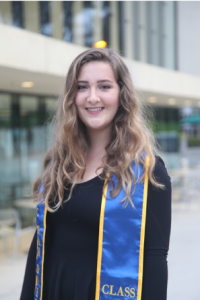Name: Sara Brooke
Hometown: Santa Rosa, CA
Hobbies: Reading, playing with my dog, playing board games
Current Lab: Dr. Patricia Janak’s Lab at Johns Hopkins University
Formerly at Salk: Systems Neurobiology Lab, in Dr. Edward Callaway’s group
Lab website: http://www.janaklab.com/
What do you study? As a graduate student, I’m studying the brains and behaviors of rats. In particular, I’m interested in understanding better how they learn and how rewards motivate them. To do this I look at brain activity in certain areas related to motivation, learning, and addiction and I try to piece together how the brain processes and uses rewards to produce behavior. These behaviors could be good for the rats—like seeking out food, or bad for them—like seeking out drugs. In order to understand how addiction hijacks the reward system in your brain we need a good idea of how a healthy brain processes rewards for comparison.
Why is it important? The work I do is considered “basic science” because I’m working to understand the simple things that your brain does—we still don’t know how to answer a lot of basic questions. Instead of looking at one disease or one application of this knowledge, the work I’m doing can one day be applied to multiple areas of interest, hopefully contributing to the way other scientists think when they’re making their own experiments. After all, we can only fix an unhealthy brain if we know how a healthy brain is supposed to function!
What piqued your interest in science? For neuroscience specifically, it was learning about the times when things go wrong in the brain and produce wacky experiences for that person. That could be someone not being able to recognize faces anymore after a stroke (prosopagnosia), or even the visual illusions that are just loopholes in the way your visual system is wired together.
What do you like about being a scientist? I love the creativity in our experiments, and the flexibility that academic research offers. Also, everyone is encouraged to be excited and inspired by what they do, which creates a really fun atmosphere!
What are 5 general vocabulary terms someone should know going into your field of science?
Action potential, experimental control, genetics, computational modeling, projection
What are 5 specific vocabulary terms someone should know about your research?
Electrophysiology (in my case: in vivo extracellular recordings), basal ganglia, reinforcement learning, network connectivity, animal models

